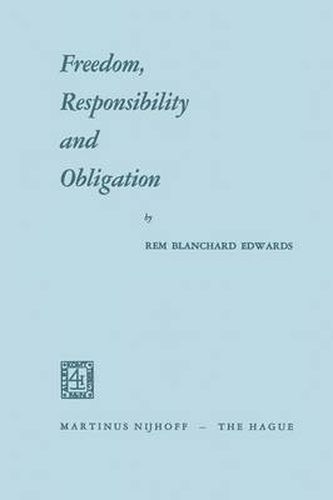Readings Newsletter
Become a Readings Member to make your shopping experience even easier.
Sign in or sign up for free!
You’re not far away from qualifying for FREE standard shipping within Australia
You’ve qualified for FREE standard shipping within Australia
The cart is loading…






This title is printed to order. This book may have been self-published. If so, we cannot guarantee the quality of the content. In the main most books will have gone through the editing process however some may not. We therefore suggest that you be aware of this before ordering this book. If in doubt check either the author or publisher’s details as we are unable to accept any returns unless they are faulty. Please contact us if you have any questions.
This work is conceived as a modem study of the relationships of the concept of human freedom with the moral concepts of responsibility and obligation and other closely allied notions. One pitfall into which writers on my sub jects have occasionally fallen has been that of spending too much time in critically examining positions and arguments which no sane philosopher has ever offered. In order to guard against the danger of debating with straw men, I have attempted to engage in critical conversations with several twentieth century writers on my theme. I have attempted to pay special at tention to a handful of writers who have written extremely important and influential discussions and who are representatives of a diversity of per spectives on the issues involved. In particular, I have taken note of the work of two determinists, Sir David Ross and Hastings Rashdall, a libertarian, C. A. Campbell, and a reprel>entative of the more recent linguistic-analytic approach, P. Nowell-Smith. Many other important writers have been brought in at crucial points in the conversation. But this is not a history of the problem in the 20th century. Rather, it is a critical, systematic study of a problem or set of related problems. This work may be divided roughly into two parts, a metaphysical-psycho logical part comprising the first three chapters, and a metaethical-ethical part consisting of the last three chapters.
$9.00 standard shipping within Australia
FREE standard shipping within Australia for orders over $100.00
Express & International shipping calculated at checkout
This title is printed to order. This book may have been self-published. If so, we cannot guarantee the quality of the content. In the main most books will have gone through the editing process however some may not. We therefore suggest that you be aware of this before ordering this book. If in doubt check either the author or publisher’s details as we are unable to accept any returns unless they are faulty. Please contact us if you have any questions.
This work is conceived as a modem study of the relationships of the concept of human freedom with the moral concepts of responsibility and obligation and other closely allied notions. One pitfall into which writers on my sub jects have occasionally fallen has been that of spending too much time in critically examining positions and arguments which no sane philosopher has ever offered. In order to guard against the danger of debating with straw men, I have attempted to engage in critical conversations with several twentieth century writers on my theme. I have attempted to pay special at tention to a handful of writers who have written extremely important and influential discussions and who are representatives of a diversity of per spectives on the issues involved. In particular, I have taken note of the work of two determinists, Sir David Ross and Hastings Rashdall, a libertarian, C. A. Campbell, and a reprel>entative of the more recent linguistic-analytic approach, P. Nowell-Smith. Many other important writers have been brought in at crucial points in the conversation. But this is not a history of the problem in the 20th century. Rather, it is a critical, systematic study of a problem or set of related problems. This work may be divided roughly into two parts, a metaphysical-psycho logical part comprising the first three chapters, and a metaethical-ethical part consisting of the last three chapters.